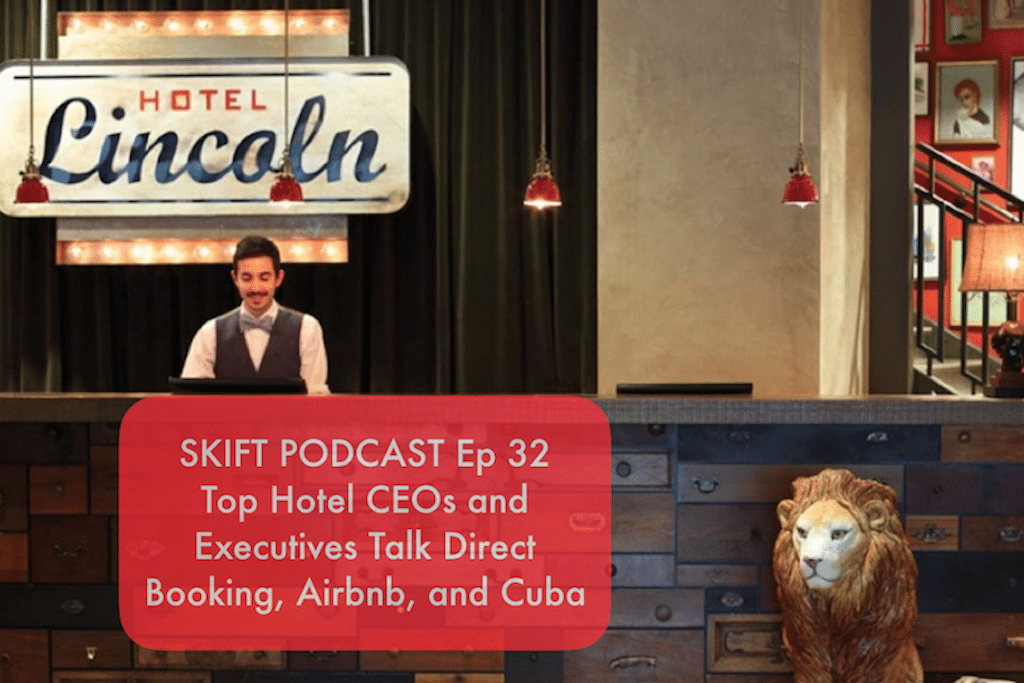Skift Take
Hotels have a lot to worry about these days. The direct booking wars have no clear frontrunner, Airbnb is on the rise, and millennials are an increasingly elusive customer base.
We looked at hospitality trends for a recent episode of the Skift Podcast, which explored how top executives deal with the push for direct booking, the rise of the sharing economy, tricky opportunities in Cuba, and more.
Hotel executives from all over the world were in New York recently for the NYU International Hospitality Industry Investment Conference, and Skift editors Deanna Ting and Greg Oates recorded interviews with many of them.
Ting and Oates join Skift podcast host Hannah Sampson and clips from Marriott International president and CEO Arne Sorenson; Choice Hotels president and chief operating officer Pat Pacious; Virgin Hotels CEO Raul Leal; AccorHotels CEO of Hotel Services for North and Central America Christophe Alaux; and Red Lion Hotels CEO Greg Mount and CFO Brian Quinn.
Here are five takeaways from the conversation:
Speaking up on social issues can have a real impact.
Part of modern hospitality is addressing sensitive topics like LGBT rights, in order to make customers feel comfortable and welcome.
“We’ve spoken out on things like the North Carolina bathroom bill, for example, many LGBT issues,” explains Sorenson. “In North Carolina, for example, there’s $100 million of business which has not booked into North Carolina because of the bill that has been passed by the state. That’s bad for the business, it’s bad for the state of North Carolina, it’s really not fair to the people of North Carolina.”
Cuba’s infrastructure isn’t ready for more tourists… yet.
It’s still early on, but giant companies like Marriott and Starwood have landed in Cuba, and they’re planning ahead for the forthcoming influx of American tourists.
“If tomorrow two million of American, North American traveler visits Cuba, the hotel business industry in the island cannot handle it,” says Alaux. “It’s not only about the hotel: you need to supply the hotel, to be able to provide wi-fi technology services, to be able to provide good food, air conditioning, nice transportation.”
The direct booking wars are heating up.
Hotels want the exposure offered by OTAs, but not the fees. In response, many hotels are pushing customers to bypass sites like Expedia and book with the hotels directly.
“Hilton, with its ‘Stop Clicking Around’ program, is the first time where there’s really been a brand-wide, concerted effort,” says Oates. “People are used to going to the OTAs… It’s almost like they want to really see all the different rates, just to make sure that they’re shopping around, getting the best rate, even if Hilton’s saying, ‘No, really: we have the best one.’”
And yet, no hotel companies seem particularly confident that they can actually win the direct booking wars.
Airbnb can’t be ignored.
At first it seemed that Airbnb was offering a totally different product than a traditional hotel, but Airbnb is now taking a serious share of hotels’ business.
Many Airbnb hosts are not just individuals making an extra buck, they’re professionals, and the playing field isn’t level. Unlike Airbnb, hotels have to pay taxes, be ADA compliant, and adhere to other regulations.
“You look at some of the major markets in New York, San Francisco, Miami, there was just some big media where somebody was buying all 10 condos in a building, and they’re putting a host out front, and they’re Airbnb-ing the whole thing,” says Quinn. “They don’t even reside there. They’re really a hotel. If they are, then they should be subject to the same elements.”
Millennials are hard to attract.
Hotels are vying for young travelers with lifestyle brands that offer “authentic experiences,” but millennials don’t want any pandering.
“I have a millennial daughter who just graduated from UVA,” says Leal. “She said, ‘Dad, I stayed at X Hotel.’ …I said, ‘’That product was created by this brand because it’s what millennials want.’ She said, ‘Dad, they don’t get it. Millennials don’t want to be told where to stay or what it should look like. We’d like to make that decision ourselves.’”
Furthermore, many millennials don’t need, or even want, the traditional hotel offerings.
“We’re eliminating the need for a desk in a room because most people don’t use it anymore. They either sit on their bed, or they sit on a chair with a grade c table,” says Mount. “We eliminated room service, but have a great bento box and pickup program for people that want to bring something back to their room. We’ve eliminated the need for front desks in our hotels. There’s no need for it anymore.”
Dwell Newsletter
Get breaking news, analysis and data from the week’s most important stories about short-term rentals, vacation rentals, housing, and real estate.
Have a confidential tip for Skift? Get in touch
Tags: hotels, skift podcast
